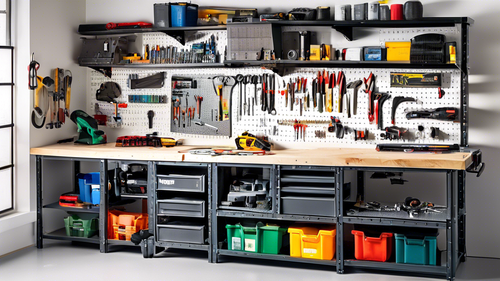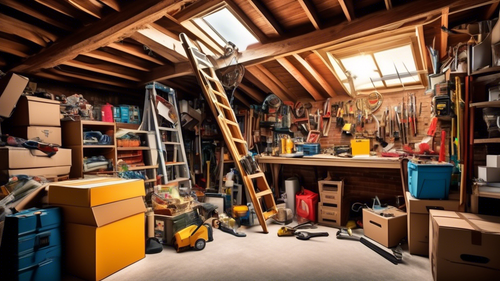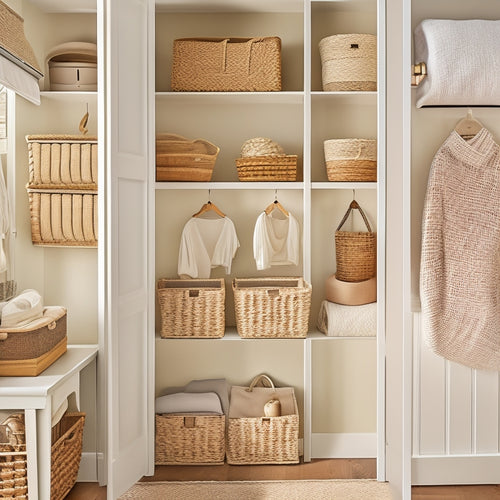
Why Cluttered Spaces Hold You Back From Productivity
Share
You're struggling to get things done amidst the chaos of your cluttered space. It's not just a physical mess - it's mentally exhausting too. Cluttered spaces fuel anxiety, stress, and overwhelm, making it tough to focus and prioritize tasks. You're wasting time searching for lost items, missing deadlines, and feeling mentally fatigued. A clutter-free workspace, on the other hand, can boost your productivity and energy. By breaking free from clutter's grip, you'll open up a clearer mind, better time management, and a more efficient workflow. Take the first step towards a more productive you - what's holding you back?
Key Takeaways
• Cluttered spaces hinder focus and productivity by creating mental clutter, leading to heightened anxiety, stress, and overwhelm.
• Physical disorganization leads to mental fatigue, making it difficult to manage time effectively and prioritize tasks.
• Clutter fuels procrastination habits, causing wasted time searching for items, and struggling to meet deadlines.
• Disorganization slows down workflow, increasing stress, and decreasing focus due to distractions, ultimately affecting the bottom line.
• Clutter-free workspaces boost productivity, enhance mental clarity, and foster creativity, allowing individuals to work more efficiently.
Clutter's Impact on Mental Health
When surrounded by clutter, you're more likely to experience heightened anxiety, stress, and feelings of overwhelm, which can impair your mental well-being to a great extent. It's no wonder that cluttered spaces can make you feel like you're stuck in a never-ending cycle of chaos.
The good news is that creating a clutter-free space can be a powerful stress reduction technique. By clearing out the physical clutter, you're also clearing out mental clutter, allowing yourself to breathe a little easier and think a little clearer.
Organized environments can have a profound impact on your mental clarity, helping you focus on what's truly important. Imagine being able to tackle your to-do list without feeling like you're drowning in a sea of paper, or being able to relax in a peaceful space that's free from distractions.
Physical Barriers to Productivity
Cluttered spaces erect physical barriers that hinder your ability to focus, making it difficult to prioritize tasks and manage your time effectively. A cluttered workspace is a productivity hindrance, and it's not just about aesthetics.
When your workspace is cluttered, you're more likely to lose important documents, waste time searching for misplaced items, and struggle to stay organized.
Imagine trying to work on a puzzle with missing pieces scattered all over the room. That's what it's like to work in a cluttered space. You'll find yourself constantly switching between tasks, trying to remember where you put that one important file, or digging through piles of paper to find a specific document.
This physical disorganization can lead to mental fatigue, making it even harder to stay focused and productive. By clearing the clutter, you're removing physical barriers that stand between you and your goals.
It's time to take control of your workspace and create an environment that supports your productivity, not hinders it.
Clutter's Effect on Time Management
When you're surrounded by clutter, you're likely to waste valuable time searching for misplaced items or information.
As a result, you'll struggle to meet deadlines and complete tasks on schedule, which can lead to feelings of anxiety and stress.
Wasting Valuable Search Time
You waste precious minutes every day searching for misplaced items or information buried beneath clutter. It's like trying to find a needle in a haystack, except the haystack is your entire workspace. This daily scavenger hunt isn't only frustrating but also a huge time-suck.
The solution lies in implementing organizing solutions that boost workspace efficiency. By designating a place for everything and keeping frequently used items within easy reach, you'll reduce search time and increase productivity.
A clutter-free workspace doesn't just save time; it also has a profound impact on your mental state. When your surroundings are organized, you feel more focused and in control. This, in turn, leads to productivity boosts that can't be ignored.
Imagine having an extra hour each day to tackle important tasks or simply enjoy a well-deserved break. By clearing the clutter, you'll gain a sense of clarity and purpose that will transform your work life.
Difficulty Meeting Deadlines
Missed deadlines and rushed projects are often the direct result of clutter's insidious impact on your time management skills. When your workspace is disorganized, it's straightforward to get bogged down in the chaos, losing sight of what needs to be done and when. You struggle to prioritize tasks, and before you know it, deadlines are looming, and you're left scrambling to get everything done.
Clutter can also fuel your procrastination habits. With a messy space, it's simple to get distracted by all the 'stuff' surrounding you, putting off important tasks until the last minute. You might find yourself constantly switching between tasks, never really focusing on one thing long enough to make progress. This leads to wasted time and energy, making it even more challenging to meet deadlines.
To break free from this cycle, establishing a system for prioritizing tasks and staying on track is crucial. Start by clearing out the clutter and creating a peaceful, organized workspace.
Then, focus on tackling one task at a time, giving yourself realistic deadlines and breaking down larger projects into manageable chunks. By doing so, you'll be able to stay on top of your work and meet deadlines effortlessly.
Slowing Down Workflow
Slowing Down Workflow
By bogging you down in a sea of disorganization, clutter slows your workflow to a crawl, making every task feel like an uphill battle. You're not alone in this struggle; clutter affects millions of people worldwide, turning what should be a productive work session into a frustrating exercise in searching, sorting, and stressing.
| Cluttered Workspace | Clutter-Free Environment |
|---|---|
| Wasted Time: 30 minutes searching for a lost document | Efficient Time: Instant access to necessary files |
| Increased Stress: Feeling overwhelmed by the mess | Reduced Stress: Clear mind, clear workspace |
| Decreased Focus: Constant distractions from clutter | Improved Focus: Laser-like attention on the task at hand |
To break free from this productivity-killing cycle, it's time to prioritize workspace organization. A clutter-free environment isn't just aesthetically pleasing; it's a game-changer for your productivity. By creating a system that works for you, you'll be able to tackle tasks with ease, meet deadlines, and enjoy a sense of accomplishment that comes with a job well done.
Hidden Costs of Disorganization
As you struggle to find what you need in a cluttered workspace, you're not just wasting time - you're also losing money. Disorganization can lead to missed deadlines, duplicated efforts, and forgotten tasks, all of which can have a significant impact on your bottom line.
Lost Time and Money
Disorganization quietly drains your wallet, wasting hours of your time and hundreds of dollars each year on unnecessary purchases, duplicated efforts, and prolonged projects. You're not just losing time, you're also throwing money out the window. The financial consequences of disorganization can be staggering.
Here's a breakdown of how disorganization affects your bottom line:
| Time Waster | Financial Impact | Solution |
|---|---|---|
| Buying duplicates | $100-$500/year | Create a centralized inventory |
| Searching for lost items | 10-30 minutes/day | Designate a "launching pad" for daily items |
| Rushing to meet deadlines | Overtime pay, late fees | Prioritize tasks, set realistic timelines |
| Subpar work quality | Re-doing work, lost clients | Implement quality control checks |
| Missed deadlines | Late fees, penalties | Establish a project management system |
Decreased Mental Clarity
When your surroundings are cluttered, your mind follows suit, leading to decreased mental clarity that can further exacerbate the disorganization problem. You start to feel overwhelmed, and it becomes challenging to focus on the task at hand. This is known as cognitive overload, where your brain struggles to process the sheer amount of information and stimuli around you.
Clutter's impact on your mental state is significant, causing mental fog that makes it difficult to think clearly and make sound decisions. Working in a cluttered environment can lead to mental fatigue, making it harder to concentrate and stay motivated. You might find yourself constantly searching for misplaced items, wasting precious time and energy.
The mental fog that settles in can also affect your creativity, making it challenging to come up with innovative solutions or approach problems from a fresh perspective. By clearing out the clutter, you can clear your mind and regain control over your thoughts and actions. With a clutter-free space, you'll be amazed at how much more focused, productive, and mentally clear you become.
Stressed Out Employees
Cluttered workspaces transform otherwise productive employees into stressed-out versions of themselves, with anxiety and frustration seeping into every aspect of their job. You start to feel like you're drowning in a sea of papers, files, and forgotten coffee cups. The constant noise of clutter can be overwhelming, making it difficult to focus on tasks and leading to employee burnout.
As you struggle to find the one important document amidst the chaos, your blood pressure rises, and your mind starts to wander. 'Why can't I just find what I need for once?' you think to yourself. The clutter around you becomes a constant source of workplace stress, making it challenging to meet deadlines and deliver quality work.
You're not alone in this struggle. Cluttered workspaces are a common phenomenon, but that doesn't mean you have to accept it as your reality. By taking control of your workspace and implementing simple organizational strategies, you can reduce stress and anxiety, and get back to being the productive, efficient employee you once were.
It's time to take back your workspace and your sanity!
Clutter's Toll on Focus and Creativity
Your ability to focus and think creatively takes a significant hit as soon as you're surrounded by clutter. It's akin to attempting to write a novel in a bustling restaurant - the noise and distractions make it impossible to concentrate.
Clutter chaos leads to creative blockage, making it challenging to come up with inventive ideas or solutions. When your workspace is cluttered, your mind is cluttered as well. You start to feel overwhelmed, and your focus drain begins. A disorganized mind can't think clearly, and you'll find yourself struggling to make decisions or prioritize tasks.
To break free from this cycle, decluttering your workspace is crucial. Get rid of anything you don't need, organize your necessary items, and create a tranquil environment that fosters creativity. You'll be amazed at how a neat space can help you focus and think more clearly.
With a clutter-free area, you'll be able to tackle intricate tasks with ease and come up with innovative solutions. So, take charge of your workspace, and witness your productivity soar!
Procrastination and Clutter Connection
You'll often find yourself putting off tasks or decisions when surrounded by clutter, as the overwhelming environment reinforces procrastination habits. It's a vicious cycle: clutter breeds procrastination, and procrastination leads to more clutter. But why does this happen?
Here are a few reasons why clutter and procrastination are BFFs:
-
Visual Overload: Cluttered spaces are overwhelming, making it difficult to focus on a single task.
-
Lack of Accountability: When your space is a mess, it's easy to hide behind the clutter and avoid taking responsibility for your work.
-
Difficulty in Prioritizing: With clutter everywhere, it's hard to prioritize tasks, leading to procrastination.
- Stress and Anxiety: Clutter can cause stress and anxiety, making it even harder to tackle tasks and decisions.
Breaking this cycle requires implementing organizational strategies that promote productivity enhancement. By creating a clutter-free environment, you can overcome procrastination and get back on track.
Clearing Clutter for Success
Now that you understand the connection between clutter and procrastination, it's time to take action and start clearing the clutter that's holding you back from achieving success.
Clearing space isn't just about tidying up; it's about creating an environment that fuels your productivity. Think of it as a fresh start, where every item has its designated spot, and your workflow becomes seamless.
As you begin clearing space, you'll notice your mind starts to organize too. The cluttered mess that was once overwhelming now becomes manageable, and your focus shifts to the tasks at hand.
You'll feel a sense of accomplishment with each item you tackle, and before you know it, your entire space will be transformed.
Frequently Asked Questions
Can a Cluttered Space Affect My Ability to Learn New Skills?
When you're surrounded by clutter, you're more prone to cognitive overload, making it tough to learn new skills. Distracted by the mess, you'll struggle with memory retention and focus, making it harder to absorb new info.
How Does Clutter Impact My Relationships With Family and Friends?
When you're surrounded by clutter, you create communication barriers and emotional disconnection with loved ones, making it tough to connect over dinner, let alone have meaningful conversations - it's like trying to have a heart-to-heart in a junkyard!
Are There Any Benefits to Clutter for Creative Individuals?
Like Einstein's famously messy workspace, you might find that cluttered inspiration sparks chaos creativity, and that messy genius lies within the disarray - but can you harness this creative benefit without getting lost in the clutter?
Can Cluttered Spaces Increase My Risk of Injury or Accident?
You're more likely to trip over that pile of papers or knock over a precariously balanced vase in a cluttered space, creating safety hazards that'll distract you from your task, decrease efficiency, and stress you out.
Does Clutter Affect Only Individuals or Also Teams and Organizations?
You're wondering if clutter's productivity-killing powers stop at individual workstations or also sabotage teams and organizations? The answer is, clutter's impact doesn't discriminate - it hinders collaboration, decreases productivity, and affects everyone, from solo workers to entire orgs.
Related Posts
-

Garage Workbench Organization
Garage Workbench Organization: A Guide to Maximizing Space and Efficiency Are you tired of a cluttered and unorgan...
-

Garage Attic Storage: What You Need to Know
Garage Attic Storage: Everything You Need to Know As a home improvement enthusiast with a passion for decluttering...
-

7 Best Budget-Friendly DIY Closet Organization Hacks
You can transform your cluttered closet into a serene oasis without breaking the bank! Repurpose old furniture pieces...


